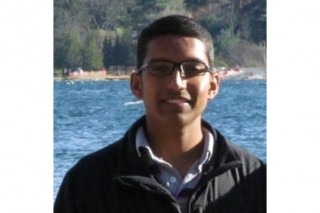Student Spotlight: Srikrishna Karanam
Srikrishna Karanam, an ALERT Ph.D. student in Computer and Systems Engineering at Rensselaer Polytechnic Institute (RPI), has been “Searching for people in camera networks,” (the title of his doctoral thesis) with his faculty advisor, Prof. Richard Radke, for over three years.
As described by Srikrishna, “The overall goal of the project is to design and develop a system, called tag and track, to assist TSA officials in detecting and tracking persons of interest in critical and busy environments such as airports. My role is to develop and implement the underlying algorithms that drive the system.” (To see the related ALERT 101 video, click here).
After completing his Bachelor of Technology degree in Electronics and Communication Engineering from the National Institute of Technology Warangal in India, Srikrishna joined RPI as a Master’s student, initially involved in tracking people as they moved in videos, before joining ALERT’s video analytics research team.
When asked what about his work drives him, he states, “I am very passionate about algorithmic research being actually used to solve real-world problems. My involvement with ALERT has provided me with a wonderful opportunity to develop algorithms and systems keeping real-world constraints in mind… How do we ensure that the system works efficiently in such cases and does not ‘lose’ the person being tracked in the crowd? This is one of the several questions I want to address going forward.”
Naturally, there have been challenges along the way. Srikrishna and his team worked to design a user-friendly system so that someone unfamiliar with Computer Vision was able to utilize the software. He states that, “The system had to work in real-time on live video feeds in the airport, so developing efficient and optimized algorithms was critical.” As a result of his work, he has authored and co-authored 9 papers (including 1 journal article and 5 conference papers in press, as well as several submitted).
When asked about his experience working with Prof. Radke, he says, “I have immensely enjoyed working with Prof. Radke. He has given me a lot of independence in developing ideas for my dissertation, and I feel that has helped me grow as a researcher.”
After he completes his Ph.D., Srikrishna hopes to transition to industry, with the goal of continuing his work with Computer Vision, and finding the opportunity to implement both basic and applied research.
Of the impact his participation in the program has had on this research interests, Srikrishna states, “ALERT’s emphasis on transitioning laboratory research to real-world solutions has had a huge impact on my research philosophy. Now, when I think of possible solution approaches to a certain problem, ensuring that my approach is adaptable to real-world scenarios is a top priority.”


There are currently no comments.
The comments are closed.